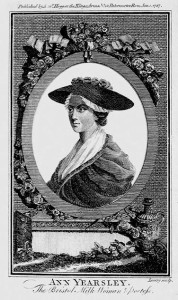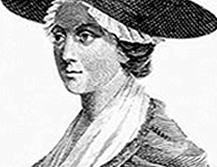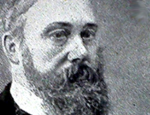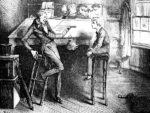Description

Meet Ann Yearsley, ‘Lactilla,’ Bristol milkmaid and Abolitionist who married a farmer and became a mother of six. She later opened a lending library. Her talent was spotted by the poet and dramatist Hannah More, who became her patron in 1783, but their ways soon parted. In Poems on Various Subjects (1787) Yearsley addresses a poem to ‘TO IGNORANCE, Occasioned by a Gentleman’s desiring the Author never to assume a Knowledge of the Ancients.’ Apparently some man had complained that she had dared to talk about the Greeks and Romans. Her response is to take Pythagoras’ notion of reincarnation, and wittily imagine all the humble forms in which ancient heroes have found themselves returned to life. Homer, for example, may have come back as a miller, Helen as a common prostitute, Ajax as a butcher. This witty tour of antiquity, which of course allows her to display her erudition as well as her defiance, is led by the figure of ‘Fancy’:
She shews me blind Homer, who ne’er must be still,
To motion perpetual decreed;
Forgetful of Ilium, he now turns a mill,
While old Nestor, quite dumb, roves the mead.
In a Tyger, Achilles bounds o’er the wide plain;
As a Fox, sly Ulysses is seen;
Doubly horn’d, Menelaus now scorns to complain,
But more blest, in a Buck skips the green.
Fond Paris, three changes with sighs has gone through,
First a Goat, then a Monkey compleat;
Enrag’d, to the river Salmacis he slew,
Wash’d his face—and forgot his fair mate.
But Zeno, Tibullus, and Socrates grave,
In the bodies of wan Garreteers,
All tatter’d, cold, hungry, by turns sigh and rave
At their Publisher’s bill of arrears.
Diogenes lives in an ambling old Beau;
Plato’s spirit is damp’d in yon fool;
While the soul of Lycurgus to Tyburn must go,
In yon Thief that is hang’d by his rule.
Longinus now breathes in a Huntsman, and swears
“That each Critic rides over his brother;
“That Muses are jilts, and that poor Garreteers
“Should in Helicon, drown one another.”
There’s Virgil, the Courtier, with hose out at heel,
And Hesiod, quite shoeless his foot;
Poor Ovid walks shiv’ring, behind a cart-wheel,
While Horace cries, “sweep for your foot.”
Fair Julia sees Ovid, but passes him near,
An old broom o’er her shoulder is thrown;
Penelope lends to five lovers an ear,
Walking on with one sleeve to her gown.
But Helen, the Spartan, stands near Charing-Cross,
Long laces and pins doom’d to cry;
Democritus, Solon, bear baskets of moss,
While Pliny sells woodcocks hard by.
In Billingsgate Nell, Clytemnestra moves slow,
All her fishes die quick in the air;
Agamemnon peeps stern, thro’ the eye of old Joe,
At Egysthus, who, grinning, stands there.
Stout Ajax, the form of a butcher now takes,
But the last he past thro’ was a calf;
Yet no revolution his spirit awakes,
For no Troy is remember’d by Ralph.
More modern Voltaire joyless sits on yon bench,
Thin and meagre, bewailing the day
When he gave up his Maker, to humour a wench,
And then left her in doubt and dismay.
Wat Tyler, in Nicholson, dares a King’s life,
At St. James’s the blow was design’d;
But Jove lean’d from heaven, and wrested the knife,
Then in haste lash’d the wings of the wind.
Here’s Trojan, Athenian, Greek, Frenchman and I,
Heav’n knows what I was long ago;
No matter, thus shielded, this age I defy,
And the next cannot wound me, I know.




